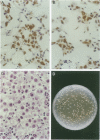Abstract
Several recent studies have suggested that testicular germ cell tumors express high levels of wild-type p53 protein. To clarify and confirm this unexpected result, we have investigated seminomatous and nonseminomatous germ cell tumors at the genomic, mRNA, and protein levels. Thirty-five tumors were examined for p53 overexpression using antibodies directed against the p53 (PAb1801, PAb240, and CM1), mdm2 (IF2), and p21Waf1/Clp1 (EA10) proteins. Thirty-two tumors were screened for p53 mutations by single-strand conformation polymorphism analysis. Eighteen tumors were screened with a functional assay that tests the transcriptional competence of human p53 protein expressed in yeast. On frozen sections, 100, 65, 35, 73, and 0% of tumors reacted with the CM1, PAb240, PAb1801, IF2, and EA10 antibodies, respectively. No p53 mutations were detected by single-strand conformation polymorphism or by functional assay. The fact that many tumors overexpress wild-type p53 but not mdm2 rules out mdm2 overexpression as a general explanation for the presence of wild-type p53 in these tumors. The absence of p21 overexpression suggests that p53 may be unable to activate transcription of critical target genes, which may explain why the presence of wild-type p53 is tolerated in this tumor type, although the mechanism for this transcriptional inactivity remains to be established.
Full text
PDF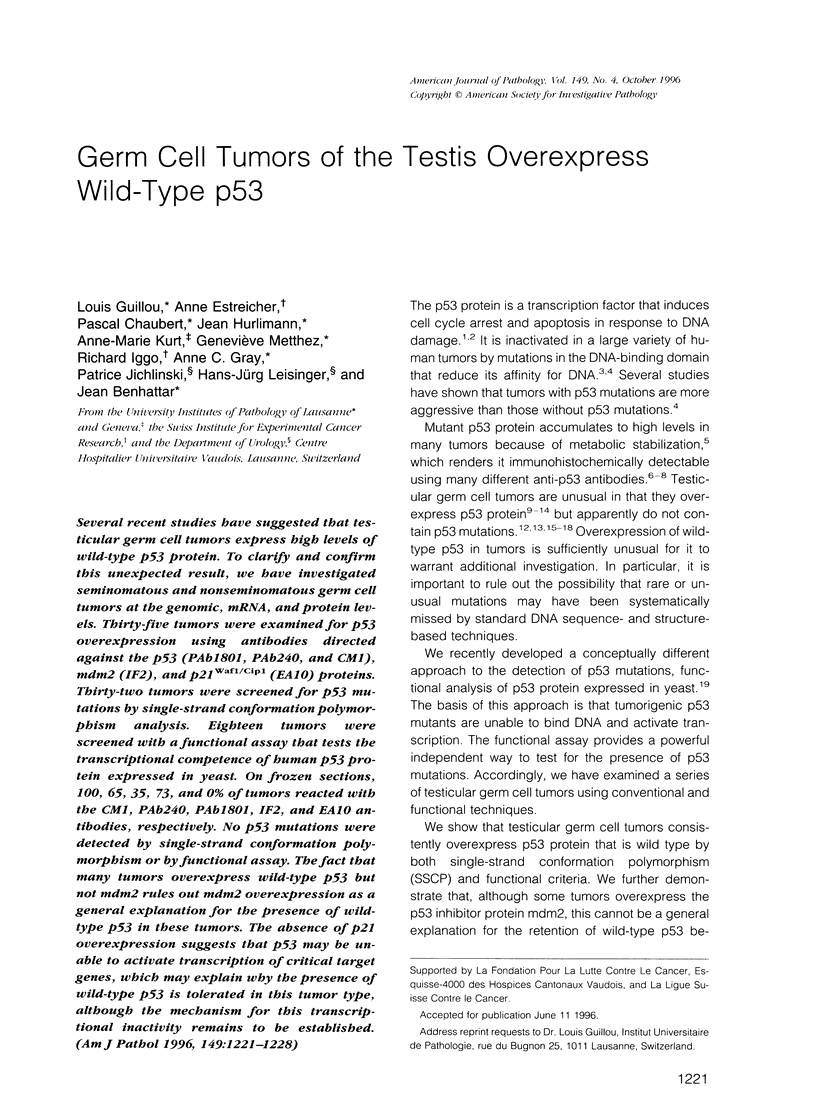
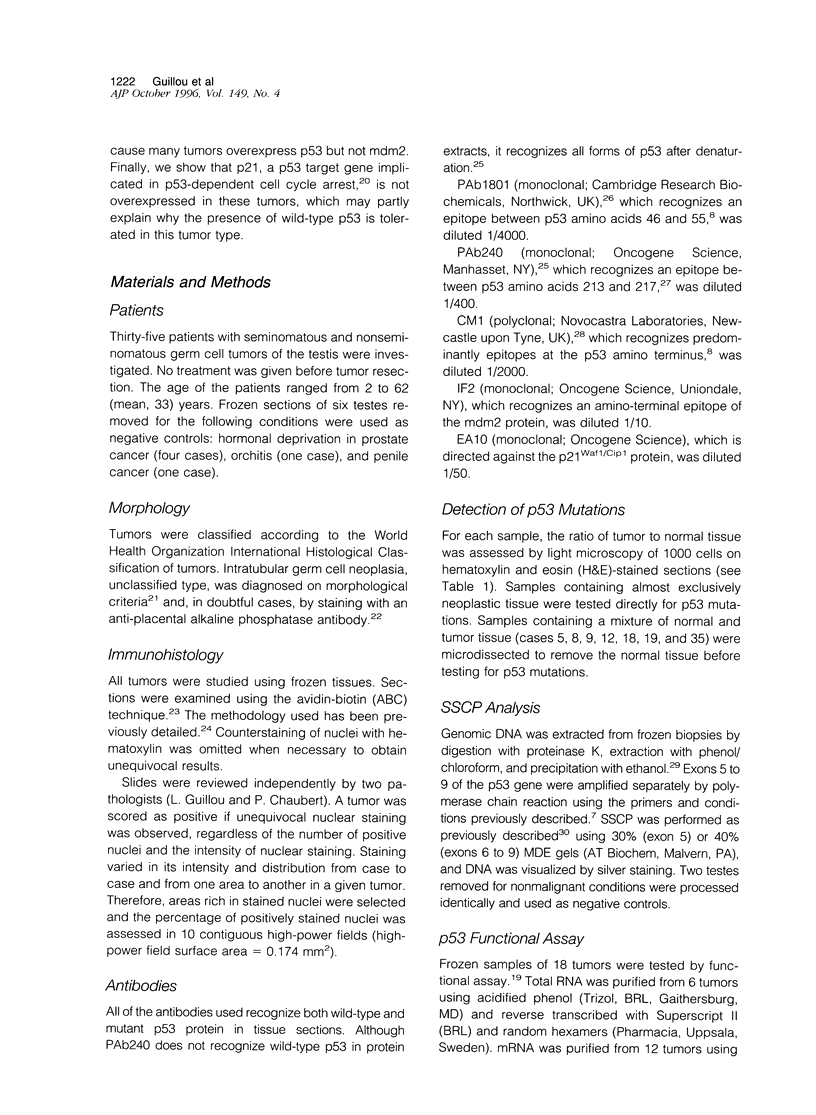
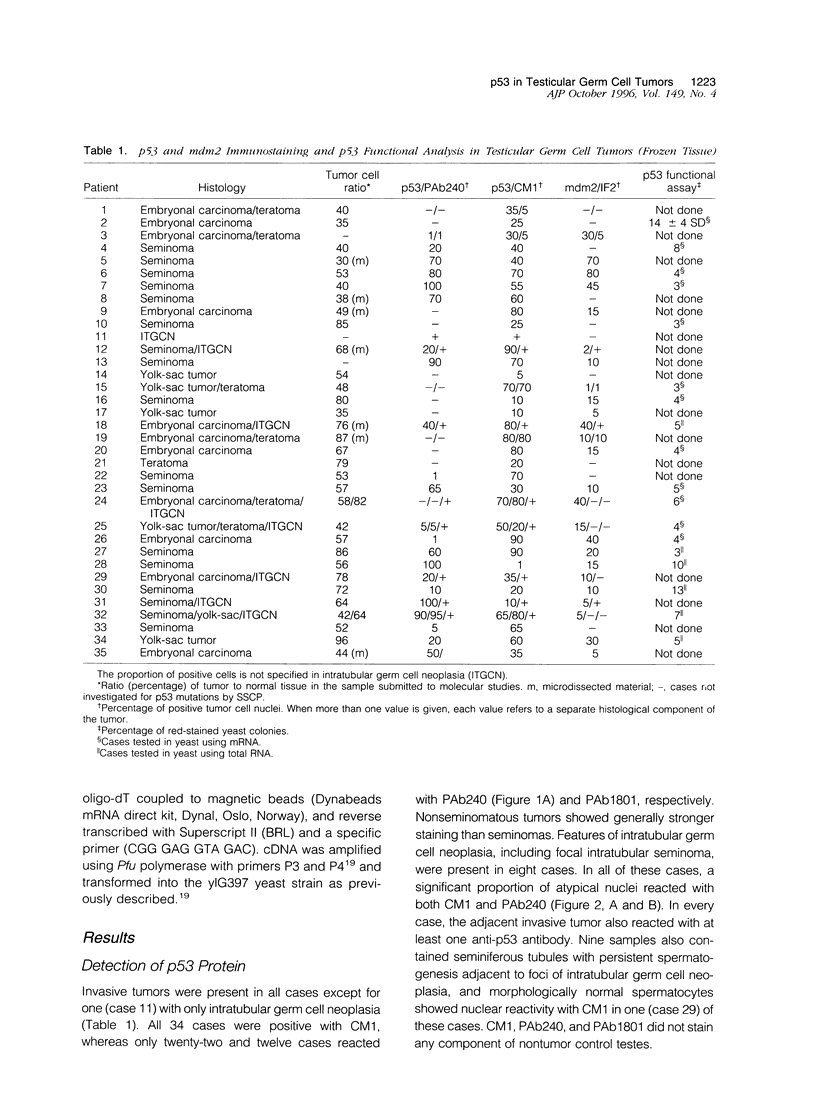
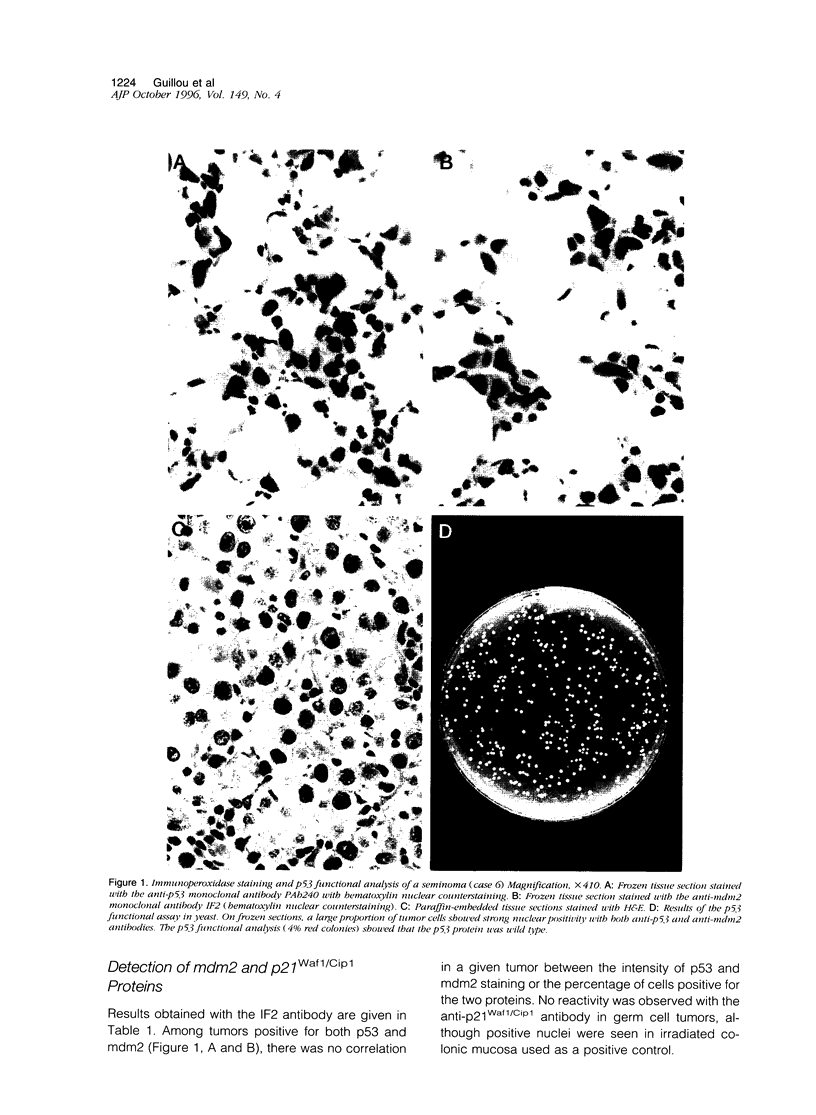
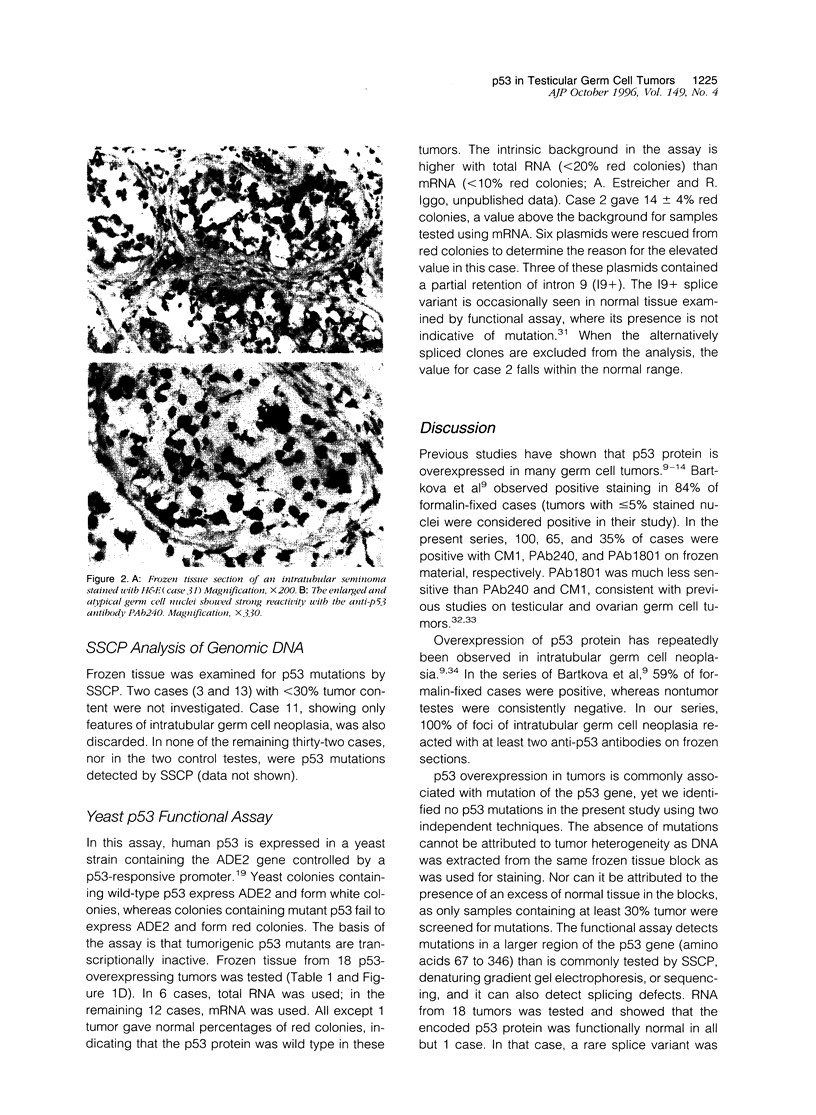
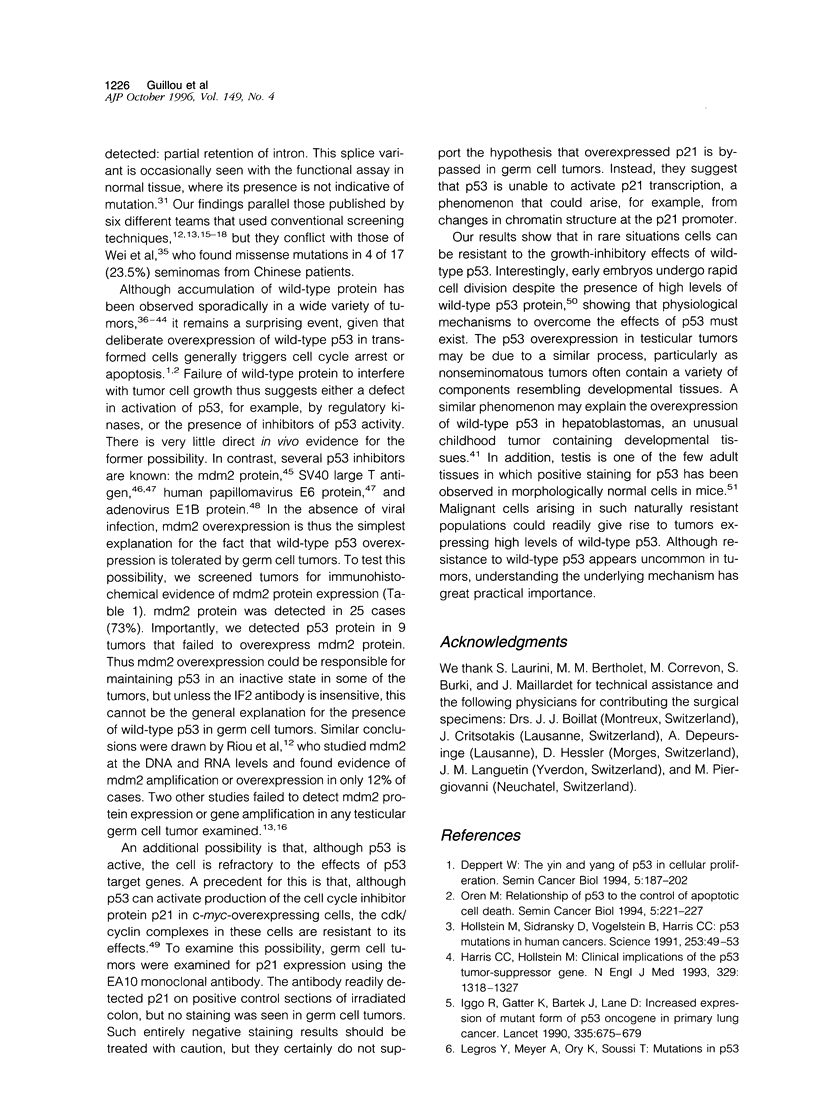
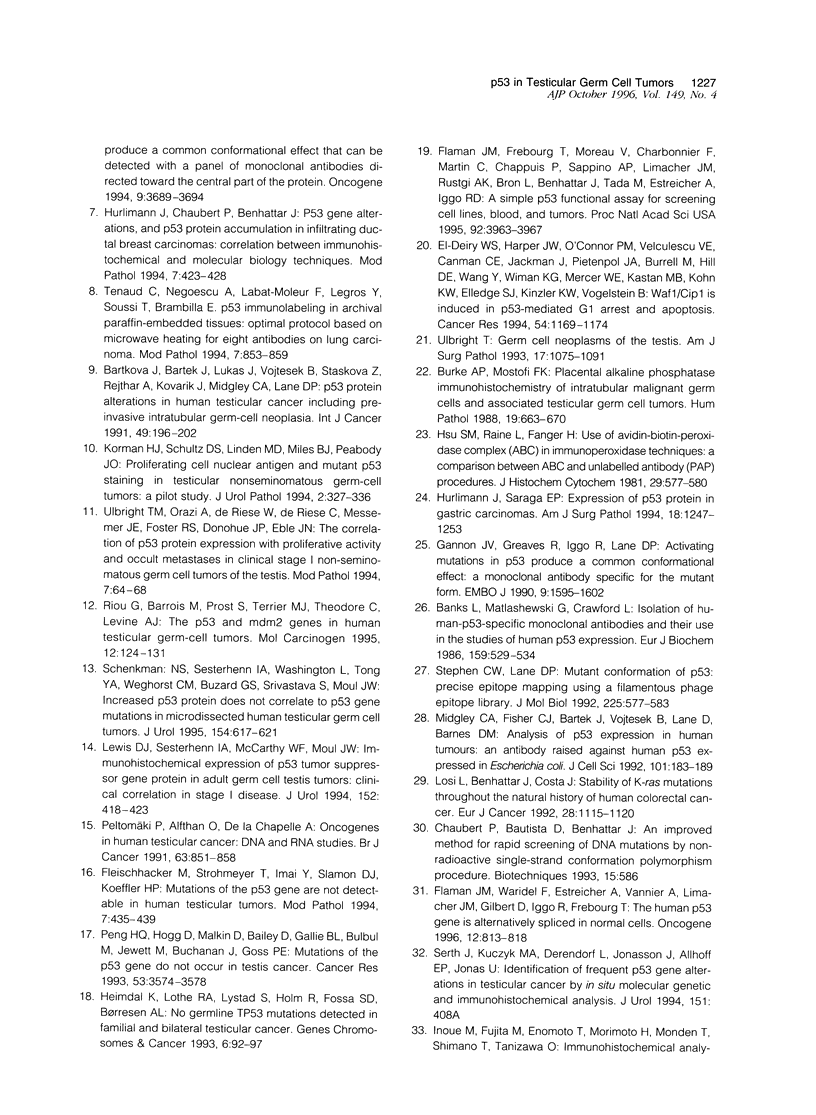

Images in this article
Selected References
These references are in PubMed. This may not be the complete list of references from this article.
- Ambros R. A., Ross J. S., Kallakury B. V., Malfetano J., Kim Y., Hwang J., Breese K., Figge J. p53 gene status in endometrial carcinomas showing diffuse positivity for p53 protein by immunohistochemical analysis. Mod Pathol. 1995 May;8(4):441–445. [PubMed] [Google Scholar]
- Banks L., Matlashewski G., Crawford L. Isolation of human-p53-specific monoclonal antibodies and their use in the studies of human p53 expression. Eur J Biochem. 1986 Sep 15;159(3):529–534. doi: 10.1111/j.1432-1033.1986.tb09919.x. [DOI] [PubMed] [Google Scholar]
- Burke A. P., Mostofi F. K. Placental alkaline phosphatase immunohistochemistry of intratubular malignant germ cells and associated testicular germ cell tumors. Hum Pathol. 1988 Jun;19(6):663–670. doi: 10.1016/s0046-8177(88)80172-2. [DOI] [PubMed] [Google Scholar]
- Bártková J., Bártek J., Lukás J., Vojtesek B., Stasková Z., Rejthar A., Kovarík J., Midgley C. A., Lane D. P. p53 protein alterations in human testicular cancer including pre-invasive intratubular germ-cell neoplasia. Int J Cancer. 1991 Sep 9;49(2):196–202. doi: 10.1002/ijc.2910490209. [DOI] [PubMed] [Google Scholar]
- Cesarman E., Inghirami G., Chadburn A., Knowles D. M. High levels of p53 protein expression do not correlate with p53 gene mutations in anaplastic large cell lymphoma. Am J Pathol. 1993 Sep;143(3):845–856. [PMC free article] [PubMed] [Google Scholar]
- Chaubert P., Bautista D., Benhattar J. An improved method for rapid screening of DNA mutations by nonradioactive single-strand conformation polymorphism procedure. Biotechniques. 1993 Oct;15(4):586–586. [PubMed] [Google Scholar]
- Deppert W. The yin and yang of p53 in cellular proliferation. Semin Cancer Biol. 1994 Jun;5(3):187–202. [PubMed] [Google Scholar]
- Farmer G., Bargonetti J., Zhu H., Friedman P., Prywes R., Prives C. Wild-type p53 activates transcription in vitro. Nature. 1992 Jul 2;358(6381):83–86. doi: 10.1038/358083a0. [DOI] [PubMed] [Google Scholar]
- Flaman J. M., Frebourg T., Moreau V., Charbonnier F., Martin C., Chappuis P., Sappino A. P., Limacher I. M., Bron L., Benhattar J. A simple p53 functional assay for screening cell lines, blood, and tumors. Proc Natl Acad Sci U S A. 1995 Apr 25;92(9):3963–3967. doi: 10.1073/pnas.92.9.3963. [DOI] [PMC free article] [PubMed] [Google Scholar]
- Flaman J. M., Waridel F., Estreicher A., Vannier A., Limacher J. M., Gilbert D., Iggo R., Frebourg T. The human tumour suppressor gene p53 is alternatively spliced in normal cells. Oncogene. 1996 Feb 15;12(4):813–818. [PubMed] [Google Scholar]
- Fleischhacker M., Strohmeyer T., Imai Y., Slamon D. J., Koeffler H. P. Mutations of the p53 gene are not detectable in human testicular tumors. Mod Pathol. 1994 May;7(4):435–439. [PubMed] [Google Scholar]
- Gannon J. V., Greaves R., Iggo R., Lane D. P. Activating mutations in p53 produce a common conformational effect. A monoclonal antibody specific for the mutant form. EMBO J. 1990 May;9(5):1595–1602. doi: 10.1002/j.1460-2075.1990.tb08279.x. [DOI] [PMC free article] [PubMed] [Google Scholar]
- Harris C. C., Hollstein M. Clinical implications of the p53 tumor-suppressor gene. N Engl J Med. 1993 Oct 28;329(18):1318–1327. doi: 10.1056/NEJM199310283291807. [DOI] [PubMed] [Google Scholar]
- Heimdal K., Lothe R. A., Lystad S., Holm R., Fosså S. D., Børresen A. L. No germline TP53 mutations detected in familial and bilateral testicular cancer. Genes Chromosomes Cancer. 1993 Feb;6(2):92–97. doi: 10.1002/gcc.2870060205. [DOI] [PubMed] [Google Scholar]
- Hermeking H., Funk J. O., Reichert M., Ellwart J. W., Eick D. Abrogation of p53-induced cell cycle arrest by c-Myc: evidence for an inhibitor of p21WAF1/CIP1/SDI1. Oncogene. 1995 Oct 5;11(7):1409–1415. [PubMed] [Google Scholar]
- Hollstein M., Sidransky D., Vogelstein B., Harris C. C. p53 mutations in human cancers. Science. 1991 Jul 5;253(5015):49–53. doi: 10.1126/science.1905840. [DOI] [PubMed] [Google Scholar]
- Hsu S. M., Raine L., Fanger H. Use of avidin-biotin-peroxidase complex (ABC) in immunoperoxidase techniques: a comparison between ABC and unlabeled antibody (PAP) procedures. J Histochem Cytochem. 1981 Apr;29(4):577–580. doi: 10.1177/29.4.6166661. [DOI] [PubMed] [Google Scholar]
- Hurlimann J., Chaubert P., Benhattar J. p53 Gene alterations and p53 protein accumulation in infiltrating ductal breast carcinomas: correlation between immunohistochemical and molecular biology techniques. Mod Pathol. 1994 May;7(4):423–428. [PubMed] [Google Scholar]
- Hurlimann J., Saraga E. P. Expression of p53 protein in gastric carcinomas. Association with histologic type and prognosis. Am J Surg Pathol. 1994 Dec;18(12):1247–1253. doi: 10.1097/00000478-199412000-00008. [DOI] [PubMed] [Google Scholar]
- Iggo R., Gatter K., Bartek J., Lane D., Harris A. L. Increased expression of mutant forms of p53 oncogene in primary lung cancer. Lancet. 1990 Mar 24;335(8691):675–679. doi: 10.1016/0140-6736(90)90801-b. [DOI] [PubMed] [Google Scholar]
- Kennedy S. M., Macgeogh C., Jaffe R., Spurr N. K. Overexpression of the oncoprotein p53 in primary hepatic tumors of childhood does not correlate with gene mutations. Hum Pathol. 1994 May;25(5):438–442. doi: 10.1016/0046-8177(94)90114-7. [DOI] [PubMed] [Google Scholar]
- Kuczyk M. A., Serth J., Bokemeyer C., Allhoff E. P., Jonassen J., Kuczyk S., Jonas U. Overexpression of the p53 oncoprotein in carcinoma in situ of the testis. Pathol Res Pract. 1994 Nov;190(11):993–998. doi: 10.1016/S0344-0338(11)80892-7. [DOI] [PubMed] [Google Scholar]
- Kupryjańczyk J., Thor A. D., Beauchamp R., Merritt V., Edgerton S. M., Bell D. A., Yandell D. W. p53 gene mutations and protein accumulation in human ovarian cancer. Proc Natl Acad Sci U S A. 1993 Jun 1;90(11):4961–4965. doi: 10.1073/pnas.90.11.4961. [DOI] [PMC free article] [PubMed] [Google Scholar]
- Lang F. F., Miller D. C., Pisharody S., Koslow M., Newcomb E. W. High frequency of p53 protein accumulation without p53 gene mutation in human juvenile pilocytic, low grade and anaplastic astrocytomas. Oncogene. 1994 Mar;9(3):949–954. [PubMed] [Google Scholar]
- Lewis D. J., Sesterhenn I. A., McCarthy W. F., Moul J. W. Immunohistochemical expression of P53 tumor suppressor gene protein in adult germ cell testis tumors: clinical correlation in stage I disease. J Urol. 1994 Aug;152(2 Pt 1):418–423. doi: 10.1016/s0022-5347(17)32753-2. [DOI] [PubMed] [Google Scholar]
- Lohmann D., Ruhri C., Schmitt M., Graeff H., Höfler H. Accumulation of p53 protein as an indicator for p53 gene mutation in breast cancer. Occurrence of false-positives and false-negatives. Diagn Mol Pathol. 1993 Mar;2(1):36–41. [PubMed] [Google Scholar]
- Losi L., Benhattar J., Costa J. Stability of K-ras mutations throughout the natural history of human colorectal cancer. Eur J Cancer. 1992;28A(6-7):1115–1120. doi: 10.1016/0959-8049(92)90468-h. [DOI] [PubMed] [Google Scholar]
- Louis D. N., von Deimling A., Chung R. Y., Rubio M. P., Whaley J. M., Eibl R. H., Ohgaki H., Wiestler O. D., Thor A. D., Seizinger B. R. Comparative study of p53 gene and protein alterations in human astrocytic tumors. J Neuropathol Exp Neurol. 1993 Jan;52(1):31–38. doi: 10.1097/00005072-199301000-00005. [DOI] [PubMed] [Google Scholar]
- Marchetti A., Buttitta F., Pellegrini S., Merlo G., Chella A., Angeletti C. A., Bevilacqua G. mdm2 gene amplification and overexpression in non-small cell lung carcinomas with accumulation of the p53 protein in the absence of p53 gene mutations. Diagn Mol Pathol. 1995 Jun;4(2):93–97. doi: 10.1097/00019606-199506000-00004. [DOI] [PubMed] [Google Scholar]
- Midgley C. A., Fisher C. J., Bártek J., Vojtesek B., Lane D., Barnes D. M. Analysis of p53 expression in human tumours: an antibody raised against human p53 expressed in Escherichia coli. J Cell Sci. 1992 Jan;101(Pt 1):183–189. doi: 10.1242/jcs.101.1.183. [DOI] [PubMed] [Google Scholar]
- Mietz J. A., Unger T., Huibregtse J. M., Howley P. M. The transcriptional transactivation function of wild-type p53 is inhibited by SV40 large T-antigen and by HPV-16 E6 oncoprotein. EMBO J. 1992 Dec;11(13):5013–5020. doi: 10.1002/j.1460-2075.1992.tb05608.x. [DOI] [PMC free article] [PubMed] [Google Scholar]
- Momand J., Zambetti G. P., Olson D. C., George D., Levine A. J. The mdm-2 oncogene product forms a complex with the p53 protein and inhibits p53-mediated transactivation. Cell. 1992 Jun 26;69(7):1237–1245. doi: 10.1016/0092-8674(92)90644-r. [DOI] [PubMed] [Google Scholar]
- Mora P. T., Chandrasekaran K., McFarland V. W. An embryo protein induced by SV40 virus transformation of mouse cells. Nature. 1980 Dec 25;288(5792):722–724. doi: 10.1038/288722a0. [DOI] [PubMed] [Google Scholar]
- Oren M. Relationship of p53 to the control of apoptotic cell death. Semin Cancer Biol. 1994 Jun;5(3):221–227. [PubMed] [Google Scholar]
- Peltomäki P., Alfthan O., de la Chapelle A. Oncogenes in human testicular cancer: DNA and RNA studies. Br J Cancer. 1991 Jun;63(6):851–858. doi: 10.1038/bjc.1991.189. [DOI] [PMC free article] [PubMed] [Google Scholar]
- Peng H. Q., Hogg D., Malkin D., Bailey D., Gallie B. L., Bulbul M., Jewett M., Buchanan J., Goss P. E. Mutations of the p53 gene do not occur in testis cancer. Cancer Res. 1993 Aug 1;53(15):3574–3578. [PubMed] [Google Scholar]
- Riou G., Barrois M., Prost S., Terrier M. J., Theodore C., Levine A. J. The p53 and mdm-2 genes in human testicular germ-cell tumors. Mol Carcinog. 1995 Mar;12(3):124–131. doi: 10.1002/mc.2940120303. [DOI] [PubMed] [Google Scholar]
- Schenkman N. S., Sesterhenn I. A., Washington L., Tong Y. A., Weghorst C. M., Buzard G. S., Srivastava S., Moul J. W. Increased p53 protein does not correlate to p53 gene mutations in microdissected human testicular germ cell tumors. J Urol. 1995 Aug;154(2 Pt 1):617–621. doi: 10.1097/00005392-199508000-00081. [DOI] [PubMed] [Google Scholar]
- Schwartz D., Goldfinger N., Rotter V. Expression of p53 protein in spermatogenesis is confined to the tetraploid pachytene primary spermatocytes. Oncogene. 1993 Jun;8(6):1487–1494. [PubMed] [Google Scholar]
- Stephen C. W., Lane D. P. Mutant conformation of p53. Precise epitope mapping using a filamentous phage epitope library. J Mol Biol. 1992 Jun 5;225(3):577–583. doi: 10.1016/0022-2836(92)90386-x. [DOI] [PubMed] [Google Scholar]
- Tenaud C., Negoescu A., Labat-Moleur F., Legros Y., Soussi T., Brambilla E. p53 immunolabeling in archival paraffin-embedded tissues: optimal protocol based on microwave heating for eight antibodies on lung carcinomas. Mod Pathol. 1994 Oct;7(8):853–859. [PubMed] [Google Scholar]
- Ulbright T. M. Germ cell neoplasms of the testis. Am J Surg Pathol. 1993 Nov;17(11):1075–1091. doi: 10.1097/00000478-199311000-00001. [DOI] [PubMed] [Google Scholar]
- Ulbright T. M., Orazi A., de Riese W., de Riese C., Messemer J. E., Foster R. S., Donohue J. P., Eble J. N. The correlation of P53 protein expression with proliferative activity and occult metastases in clinical stage I non-seminomatous germ cell tumors of the testis. Mod Pathol. 1994 Jan;7(1):64–68. [PubMed] [Google Scholar]
- Xu L., Chen Y. T., Huvos A. G., Zlotolow I. M., Rettig W. J., Old L. J., Garin-Chesa P. Overexpression of p53 protein in squamous cell carcinomas of head and neck without apparent gene mutations. Diagn Mol Pathol. 1994 Jun;3(2):83–92. doi: 10.1097/00019606-199406000-00004. [DOI] [PubMed] [Google Scholar]
- Yew P. R., Berk A. J. Inhibition of p53 transactivation required for transformation by adenovirus early 1B protein. Nature. 1992 May 7;357(6373):82–85. doi: 10.1038/357082a0. [DOI] [PubMed] [Google Scholar]
- el-Deiry W. S., Harper J. W., O'Connor P. M., Velculescu V. E., Canman C. E., Jackman J., Pietenpol J. A., Burrell M., Hill D. E., Wang Y. WAF1/CIP1 is induced in p53-mediated G1 arrest and apoptosis. Cancer Res. 1994 Mar 1;54(5):1169–1174. [PubMed] [Google Scholar]



